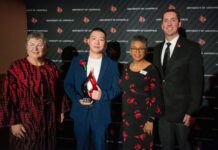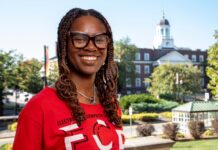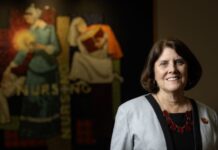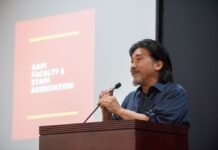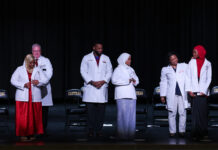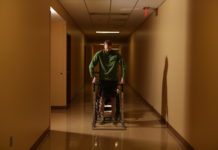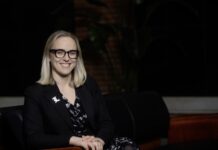This is particularly true in the field of psychiatry. The University of Louisville Department of Psychiatry has taken steps for several years to incorporate cultural sensitivity into the training and continuing medical education it offers its trainees and faculty. This year, third-year resident Monique Upton, MD, went one step further.
Upton, who will pursue further training in child psychiatry next year, won a fellowship from the Substance Abuse and Mental Health Services Administration (SAMHSA) last year. SAMHSA fellowships provide grants to encourage and facilitate the doctoral and post-doctoral development of minority nurses, psychiatrists, psychologists and social workers.
“When I won the fellowship I received grant money to come up with creative ways to enhance the teaching of cultural competency in our program,” Upton said.
So instead of a putting together a short lunch where some cultural issues would be addressed, Upton and faculty members Barbara Fitzgerald and Carmelita Tobias planned an afternoon’s worth of speakers. The March 9 event also included an evening reading from an acclaimed author whose books are based on his family’s struggles with mental illness.
Nearly 30 students, trainees and clinicians from UofL and the community settled in after lunch from a local Cuban restaurant to hear from Alfonso Nichols, MD, UofL clinical assistant professor of psychiatry and practitioner with Seven Counties Services; Leah Dickstein, MD, UofL emeritus professor of psychiatry; and Otis Anderson, MD, a fellow in child and adolescent psychiatry at the University of Tennessee-Memphis.
Nichols talked about Latino culture, the stigma that often is attached to mental health issues in that community, and how such things as family involvement, folk healers and belief in spirits play a role when Latinos seek psychiatric care.
“I encourage you, in your practice, to ask about culture, and be open-minded when you get the answers,” Nichols said.
He also talked about the value of a good interpreter.
Dickstein discussed gender issues and domestic violence.
“Always ask patients, ‘have you ever been physically or sexually abused,’ and leave 15 seconds of silence,” Dickstein said. “Then end by saying ‘when you are ready to tell me, I’m listening.’”
Anderson addressed unique issues that black men face, noting that African American men with three or more psychiatric diagnoses are 17 times more likely to commit suicide than those without.
“This is the fifth year that we’ve been doing something to raise awareness of cultural issues as they relate to treatment, but it’s the first year that it’s been such an extensive program. That’s thanks to Dr. Upton,” said Allan Tasman, MD, chair of the Department of Psychiatry.
“In psychiatry, understanding both the illness and the person who has the illness — who they are — is very important to optimal treatment success,” he continued. “Treatment requires a real collaboration between the patient and the doctor; it does in all medicine, but especially in psychiatry. So, we must understand who is the person with the illness to best interact with them. The individual’s cultural, racial and ethnic background is a critically important aspect of our appreciation of our patient’s identity.”
The day ended with a public dinner event and a reading by author Victor Lavalle from his book “Big Machine,” which touches on the subjects of religion and mental illness. Lavalle has said his experiences with family members who have suffered with mental illnesses inspired his books.
“The day was a huge success,” Upton said. “It was great to expand this important event to a full day of workshops, and we had a great turnout both during the afternoon and at the dinner. Coming from a place of cultural humility and knowing how to deal with core beliefs which may be different from yours are such an important part of being a good psychiatrist and a good doctor.”



